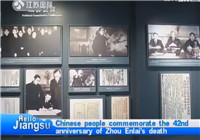January 8, 2018 marks the 42nd anniversary of the passing of New China’s first premier Zhou Enlai. On this day, people in China dearly commemorate the great figure who devoted himself to the country. Zhou Enlai, premier of the People’s Republic of China since 1949, dies of cancer at age of 77.
People in Nanjing visited the Meiyuan Xincun Memorial Hall, which is converted from a row of houses where Zhou Enlai, serving as the head of the CPC delegation, lived and worked when negotiating with the Kuomintang government in the mid-1940s after the defeat of the Japanese.
More than 300 precious files and photos were displayed and some of them were exhibited for the first time.
The exhibits also include the transmitter-receiver that was used by the CPC delegation and the household residence card handwritten by Zhou and his wife Deng Yingchao.
People in Huai’an ciy also visited the Zhou Enlai Memorial Museum to pay respect to the late premier. Zhou was born in 1898 in Huai’an though his ancestral root is in Shaoxing city of Zhejiang province.
Zhou was second to Mao Zedong, the leader of the revolution that brought a communist regime to China, in terms of importance in the PRC. Beyond his significance as a leader of communist China, Zhou was instrumental in the negotiations that resulted in the U.S. recognition of the PRC in 1979.
Zhou was heavily involved in the Chinese Communist Party by the 1920s. He rose quickly through the party ranks and became one of Mao Zedong’s most trusted advisors, particularly valued for his skill at negotiations and diplomacy. In 1949, Zhou was appointed premier and foreign minister of the new government.
During the 1950s, he represented China at various diplomatic gatherings, including the 1954 Geneva Conference and the 1955 Asian-African Conference in Bandung. He was also a stabilizing force inside China during the tumultuous years of the Cultural Revolution and its resultant political tensions.
In the early 1970s, Zhou embarked on a program to rebuild relations with the United States, which had refused to recognize the Chinese communist government. In 1972, he and President Richard Nixon shocked the world by meeting and agreeing to work for closer political and economic relations between the two nations. These talks eventually did bear fruit in 1979, when the United States formally recognized the PRC.






